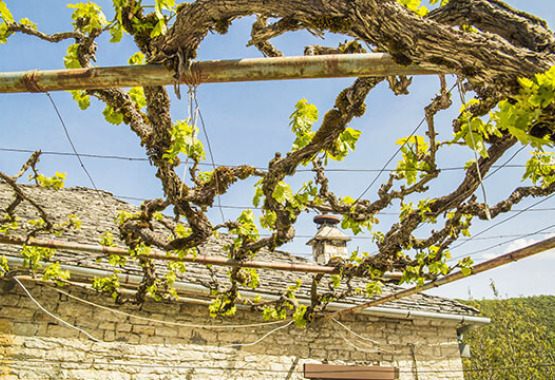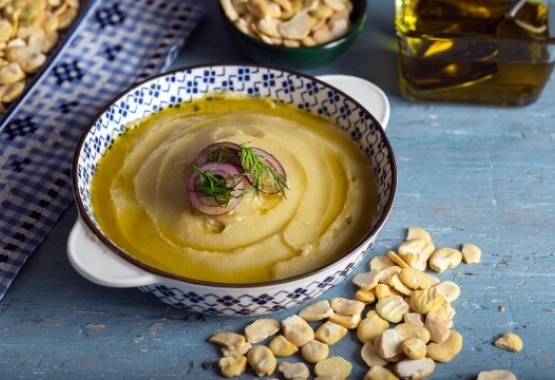
AROUND GREECE
Today Greek viniculturists make some of the most amazing sweet wines in the world, and you are invited on this unique journey where the senses of sight, smell and taste play an important role. The wine colours range from pale gold to deep purple; their aromas call to mind freshly-picked fruit and the desiccated, “rancio”—nutty—character that comes only after years of oaking; and their flavours range from a taste of glamorous intensity to a velvety character feel!
Greek sweet wines can be the perfect drink on any occasion and could easily turn into a cherished experience. All you wine lovers will no doubt find among the top quality Greek dessert wines the one that is perfect to your palate. And for all of you who look for the right combinations of wine and food, —whether the latter means an exotic dish or a complex last course, Greek dessert wines will broaden your taste horizons and win a special place in your heart!
Serving suggestions: Santorini’s fascinating, rich Vinsanto, with its refreshing acidity and huge extract, is to be enjoyed either on its own or deliciously matched with baklava or any other sweet pastry made with phyllo, as well as with chocolate, baked quince, and cakes. Vinsanto is also considered a savoury-sweet wine. Try it with dense, intense, creamy cheeses or even roasted meat stuffed with fruit and mince pies.
The rich, grapey aroma and balanced, fruity acidity of Greek Muscat wines have earned them a high place among the finest examples of their kind in the world. Candied oranges, gingerbread cookies, apple or apricot pie, white chocolate, fruit cake, feta and blue cheeses are a fine complement to the honey and citrus flavours of Muscats. The Muscat Blanc is cultivated in six CDO (controlled appellation of origin) areas; three of them are in the Aegean Sea: Samos, Lemnos, and Rhodes Islands. The other three are Patras, Rio of Patras, and Cephalonia Island in the Ionian Sea.
Serving suggestions: This wine makes the perfect match for a wide variety of light desserts such as fruit salads, fruit tarts, vanilla ice-cream as well as the traditional galaktoboureko. Yet, even when served on its own, a well-chilled Muscat of Lemnos wine is a sheer delight to the palate. It is a wine which has evolved through thousands of years of winemaking.
Samos Muscats may be fortified and drunk young, being very fruit forward, and not overly complex; or they can be aged in oak for two or three years, which makes them more complex, spicy, and multi-layered.
Serving suggestions: Muscat Samos wine is a lovely accompaniment to blue cheeses and fruity or nutty desserts. Are you adventurous enough? Try this wine with a lobster dish.
Serving suggestions: Serve at 12°C- 16°C. The powerful, nutty sweetness of Mavrodaphne dessert wine does well with chocolate and nutty desserts as well as mince pies. It can also be used as a flavouring agent in a variety of dark-coloured sauces served with beef gravy, roasted chicken or turkey.
Tip: The oldest vintages are aged in large oak casks for many years. These are special wines for special occasions, to be paired with bitter chocolate or unsweet desserts.
The rich Cretan vineyard offers sweet wine lovers two wonderful varieties. The Liatiko is an exclusive red Cretan variety that holds on since antiquity and is named after the month the grapes are ripen in July (Ioulios in greek). This variety following a certain vinification creates fabulous sweet wines. The second one is Romeiko, an indigenous to Chania red variety. Apart from the local wine from Kissamos, the Romeiko variety creates luscious wines that have been internationally awarded. The overripe grapes are harvested and let under the Cretan hot sun for some days. Then follows vinification process and in some cases wine ageing.
Serving suggestions: Enjoy cretan sweet wines by themselves as an aperitif or combine them with fruits, fruity desserts and Cretan spicy kefalograviera cheese.
PDO Mavrodafni Patron- Patras
PDO Moschatos Kephalinias- Muscat Cephalonia
PDO Moschatos Lemnou- Muscat Lemnos
PDO Moschatos Patron- Muscat Patras
PDO Moschatos Riou Patron- Muscat Rion Patras
PDO Moschatos Rhodou- Muscat Rhodes
PDO Samos
PDO Dafnes
PDO Sitia
PDO Malvasia Paros
PDO Monemvasia-Malvasia
PDO Santorini
PDO Naousa
PDO Nemea
PDO Rhodos
PDO Zitsa
PDO Amynteo
PDO Anchialos
Greek sweet wines
They will make your life sweeter
Greece is a country known for its sweet wines since antiquity, and holds a good place among today’s sweet wine producing countries. Greek dessert wines win over even the most demanding wine lover as they combine top quality, age-old tradition, distinct terroir flavour as a result of the warmth of the sun which contributes to aroma and flavour intensity. What’s more, the unique native varieties, almost exclusively used in the production of dessert wines, add to the creation of this scintillatingly sweet mosaic!Today Greek viniculturists make some of the most amazing sweet wines in the world, and you are invited on this unique journey where the senses of sight, smell and taste play an important role. The wine colours range from pale gold to deep purple; their aromas call to mind freshly-picked fruit and the desiccated, “rancio”—nutty—character that comes only after years of oaking; and their flavours range from a taste of glamorous intensity to a velvety character feel!
Greek sweet wines can be the perfect drink on any occasion and could easily turn into a cherished experience. All you wine lovers will no doubt find among the top quality Greek dessert wines the one that is perfect to your palate. And for all of you who look for the right combinations of wine and food, —whether the latter means an exotic dish or a complex last course, Greek dessert wines will broaden your taste horizons and win a special place in your heart!
Famous Vinsanto- the Nectar of Santorini
Vinsanto is produced exclusively on Santorini Island from the indigenous varieties of Assyrtiko, Aidani and Athiri. The grapes grow very ripe and concentrated, while retaining enormous amounts of acidity. After a week or so of drying in the sun and at least two years in large oak barrels, Vinsanto emerges as one of the most sumptuous golden nectars in the world.Serving suggestions: Santorini’s fascinating, rich Vinsanto, with its refreshing acidity and huge extract, is to be enjoyed either on its own or deliciously matched with baklava or any other sweet pastry made with phyllo, as well as with chocolate, baked quince, and cakes. Vinsanto is also considered a savoury-sweet wine. Try it with dense, intense, creamy cheeses or even roasted meat stuffed with fruit and mince pies.
Muscat- The king of sweet wine
The rich, grapey aroma and balanced, fruity acidity of Greek Muscat wines have earned them a high place among the finest examples of their kind in the world. Candied oranges, gingerbread cookies, apple or apricot pie, white chocolate, fruit cake, feta and blue cheeses are a fine complement to the honey and citrus flavours of Muscats. The Muscat Blanc is cultivated in six CDO (controlled appellation of origin) areas; three of them are in the Aegean Sea: Samos, Lemnos, and Rhodes Islands. The other three are Patras, Rio of Patras, and Cephalonia Island in the Ionian Sea.
Muscat of Lemnos
The dry climate and the volcanic soil of Lemnos Island help mature to perfection the large berries of the Muscat of Alexandria grape variety which is cultivated in over 95% of the island’s vineyards, making Lemnos one of the predominant Greek locations producing sweet wines. With a mild aromatic and flavourful character, the sweet Muscat of Lemnos wine exudes hints of apricot, mint, and spearmint.Serving suggestions: This wine makes the perfect match for a wide variety of light desserts such as fruit salads, fruit tarts, vanilla ice-cream as well as the traditional galaktoboureko. Yet, even when served on its own, a well-chilled Muscat of Lemnos wine is a sheer delight to the palate. It is a wine which has evolved through thousands of years of winemaking.
Muscat of Samos
Samos Muscats are luscious, deep, and intense, and the island produces quite a few wines. The aromas of the Samos muscat wines are both rich and unique while the notes that prevail are fruity and floral, reminiscent of fresh grapes, orange blossoms and rose petals. Wines made of the muscat variety bear the distinct flavour and primary aroma of the fruit. Muscat wines are, by definition, the perfect example of a fruity wine.Samos Muscats may be fortified and drunk young, being very fruit forward, and not overly complex; or they can be aged in oak for two or three years, which makes them more complex, spicy, and multi-layered.
Serving suggestions: Muscat Samos wine is a lovely accompaniment to blue cheeses and fruity or nutty desserts. Are you adventurous enough? Try this wine with a lobster dish.
Muscat of Rio Patras
It is a lighter version of the above Muscat, with aromas of flowers and fruits, such as peach, melon and orange.Serving suggestions: Serve at 10 ° C - 12 ° C. Enjoy it on its own or next to fruity desserts, ice cream and fruits.Mavrodaphne
Mavrodaphne is, in some ways, Muscat’s black brother. It is one of the best known Greek wines and one that has earned international acclaim. Mavrodaphne, which means black laurel, is a variety which produces wines with deep colour, intense nose full of dark but not heavy fruit, sweet spices, and complex herbs. There are two PDO awarded to Mavrodaphne: the smaller Mavrodaphne of Cephalonia and the larger and much better known, Mavrodaphne of Patras (Peloponnese).Serving suggestions: Serve at 12°C- 16°C. The powerful, nutty sweetness of Mavrodaphne dessert wine does well with chocolate and nutty desserts as well as mince pies. It can also be used as a flavouring agent in a variety of dark-coloured sauces served with beef gravy, roasted chicken or turkey.
Tip: The oldest vintages are aged in large oak casks for many years. These are special wines for special occasions, to be paired with bitter chocolate or unsweet desserts.
Sweetness of Cretan wines
Liatiko and Romeiko varietiesThe rich Cretan vineyard offers sweet wine lovers two wonderful varieties. The Liatiko is an exclusive red Cretan variety that holds on since antiquity and is named after the month the grapes are ripen in July (Ioulios in greek). This variety following a certain vinification creates fabulous sweet wines. The second one is Romeiko, an indigenous to Chania red variety. Apart from the local wine from Kissamos, the Romeiko variety creates luscious wines that have been internationally awarded. The overripe grapes are harvested and let under the Cretan hot sun for some days. Then follows vinification process and in some cases wine ageing.
Serving suggestions: Enjoy cretan sweet wines by themselves as an aperitif or combine them with fruits, fruity desserts and Cretan spicy kefalograviera cheese.
Did you know?
Dessert wines owe their sweetness to sugar remaining in the wine after the alcoholic fermentation has been completed! Stopping fermentation can be a naturally occurring process as is the case with naturally sweet wines. Sweet natural wines as known as Vins de Liqueur; these are fortified wines and fermentation is stopped at a fairly low alcohol level.PDO Wines - Greek sweet wines
PDO Mavrodafni Kephalinias -CephaloniaPDO Mavrodafni Patron- Patras
PDO Moschatos Kephalinias- Muscat Cephalonia
PDO Moschatos Lemnou- Muscat Lemnos
PDO Moschatos Patron- Muscat Patras
PDO Moschatos Riou Patron- Muscat Rion Patras
PDO Moschatos Rhodou- Muscat Rhodes
PDO Samos
PDO Dafnes
PDO Sitia
PDO Malvasia Paros
PDO Monemvasia-Malvasia
PDO Santorini
PDO Naousa
PDO Nemea
PDO Rhodos
PDO Zitsa
PDO Amynteo
PDO Anchialos




